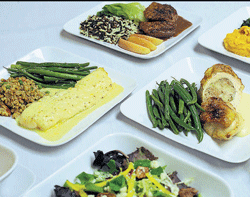What you eat could be killing you slowly: CSE
Zero trans fats? What’s that, asks the Centre for Science and Environment whose latest study picks holes in absurd claims made by some of the biggest brands in junk food.

Most of the stuff out there has enough trans fats, salt and sugar to lead to an early onset of diseases among the young, CSE says in the study released on Friday. But the government, unfortunately, hasn’t woken up to the fact.
This is the first comprehensive Indian study to have taken a close look at nutritional claims put out by the mega junk food companies and check these out against the “allowed daily intake”.
The National Institute of Nutrition (NIN) and the World Health Organisation (WHO) have set benchmarks of how much salt, sugar, carbohydrates and fats an individual can have on a daily basis to stay healthy.
After testing products from some leading brands, the CSE concluded its findings were “pretty damning”. Maggi and Top Ramen noodles, MacDonald’s foods, KFC’s fried chicken and Haldiram’s “aloo bhujia” were among the 16 big brands tested by the CSE lab.
Just one serving of potato chips, “aloo bhujia”, noodles, soft drinks, burgers, French fries and fried chicken can completely overturn our daily diet chart, the CSE said.
“For instance, the NIN benchmark for the maximum salt that one person should have in a day is 6 gm, while the WHO puts it at 5 gm,” the study said.
Salt, however, is not the real problem. Trans fats is. In a balanced diet, a maximum of 1 per cent of total energy should come from trans fats, according to the WHO. An adult male can have 2.6 gm of trans fats per day, an adult female 2.1 gm and a child over ten, 2.3 gm.
But misinformation, misbranding, and an obfuscation of the facts has become the order of the day with the top of the charts junk food manufactures.
According to the CSE a MacDonald’s Happy Meals contributes to 90 per cent of a child’s daily requirement of trans fats, but the packet makes no mention of its trans fats content.
Top Ramen Super Noodles (Masala) claims there is zero trans fats in every 100 gm. The CSE study found 0.7 gm per 100 gm. Haldiram’s “aloo bhujia,” too, says it contains no trans fats, but the study found 2.5 gm per 100 gm.
“PepsiCo sold its Lays Snack Smart till February 2012 with advertising claims that the chips are healthy because they are cooked in healthy oil and have zero trans fats. This claim was quietly removed later. When the CSE checked it found as much as 3.7 gm of trans fats per 100 gm of the product in March 2012 batch, which is a dangerously high dose.” But PepsiCo never bothered to inform consumers.
What makes junk food so unhealthy are the high levels of salt, sugar, fats and carbohydrates. The heavy doses of trans fats combined with the salt are known to trigger ill health. Non-communicable diseases such as obesity and diabetes account for more than 50 per cent of all deaths in India in 2005; by 2030 it is estimated they will kill two-thirds of all Indians.